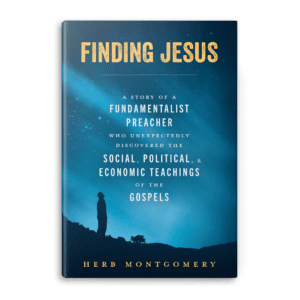
Lastly, in this week’s reading we see an important if-then statement: If you love Jesus, then follow his teachings.
To be honest, it is a lot easier to revere Jesus and to worship Jesus in word and song than it is to choose every day to follow the ethics and values we find in the Jesus story. In the Jesus story we find a Jesus who taught inclusion of the marginalized, resource-sharing with the poor, wealth redistribution from the rich, nonviolent resistance for the oppressed, treating others the way we would like to be treated ourselves, and an ethic expressed through justice above all else.
Welcome Readers! Please subscribe to Social Jesus Here.
(Read this series from the beginning at Part 1 and Part 2.)
It’s much easier for privileged, powerful, and propertied Christians to religiously worship a Jesus who promises us a beautiful afterlife, than it is for us to socially, politically, and economically follow the ethics and values our Jesus taught as challenging but fruitful means of reshaping the injustices, oppressions and violence of our present society.
I’m reminded of the poem “A Dead Man’s Dream” by Carl Wendell Hines, Jr. Hines who wrote this poem in 1965 after the assassination of Malcolm X. After Martin Luther King, Jr., was assassinated in 1968 his poem also came to be associated with Dr. King.
“Now that he is safely dead,
Let us praise him.
Build monuments to his glory.
Sing Hosannas to his name.
Dead men make such convenient heroes.
For they cannot rise to challenge the images
That we might fashion from their lives.
It is easier to build monuments
Than to build a better world.
So now that he is safely dead,
We, with eased consciences will
Teach our children that he was a great man,
Knowing that the cause for which he
Lived is still a cause
And the dream for which he died is still a dream.
A dead man’s dream.”
To apply this poem to Jesus of Nazareth for Christians leads to some haunting questions. Have we simply built churches as monuments to Jesus? What images of Jesus that Christianity has shaped would Jesus challenge if he physically walked the earth today? Have we built a religion when we should have been building a different world, a safe, compassionate, just world big enough for all of our differences and where each us treat each other the way we would like to be treated? Have we taught the message of Jesus’ greatness while ignoring the truths he taught and the solidarity with the marginalized he modeled that made him so great?
The phrases that give me pause in this week’s reading are: “If you love me, keep my commands” and “Whoever has my commands and keeps them is the one who loves me.”
Forget a religion or gospel about Jesus for a moment. What was the gospel our Jesus himself taught in the story? Are the things we as Christians so passionate about the same things that Jesus was passionate about? Are the things this Jesus was so passionate about, the themes and truths that he taught and emphasized, the centerpieces of our teaching and action?
Some Christians today are intentionally endeavoring to answer in the affirmative. There are also large portions of Christianity that are known instead for their hate and bigotry. For these Christians, the Jesus of the gospels (even John) is strangely silent on the issues they are most vocal about, and the themes Jesus focused most intently on would threaten their social privileges too much. This kind of Christianity has to avoid or deprioritize the gospels because within those stories we run headlong into Jesus’ teachings.
I have to allow myself to be confronted by this contradiction regularly. It’s much easier for me to focus on the parts of the New Testament that subtly redirect me toward cosmological claims about Jesus rather than to Jesus’ call for obedience to his teachings. I don’t want it to be said of me that what I loved was the hope of heaven, not Jesus, because loving Jesus means actually loving the things he taught and following them. And so, in the spirit of this week’s reading, I have to ask myself: do I really love Jesus—the political, social, economic Jesus of the gospels? Or am I simply addicted to the religious candy that my religion about Jesus offers, if I only believe?
 Herb’s new book, Finding Jesus: A story of a fundamentalist preacher who unexpectedly discovered the social, political, and economic teachings of the Gospels, is now available at Renewed Heart Ministries.
Herb’s new book, Finding Jesus: A story of a fundamentalist preacher who unexpectedly discovered the social, political, and economic teachings of the Gospels, is now available at Renewed Heart Ministries.














